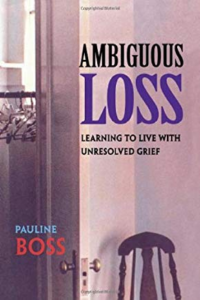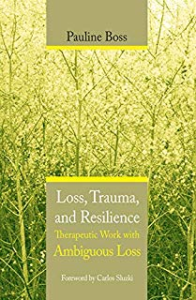You can’t always get what you want ... but you might find you can learn to be okay with that.
By B.K. Jackson
Most of the losses we experience in life require little explanation and are universally recognized and understood, such as the death of our loved ones. They were among us — and then they weren’t. We may have witnessed their transition from life to death, from breathing to not breathing. We may have seen their bodies lowered to the ground and have attended ceremonies acknowledging the gravity of our losses. We miss the dead, mourn for them, and are comforted by others who understand and may grieve with us. Over time, the sadness over their absence, while it may never evaporate, dissipates.
But some loss is less clear, even more distressing, and may last forever. Ambiguous loss is the traumatic loss of a person, a relationship, or even the desire for a relationship, for which there is no possibility of closure. The term may also pertain to a problem that can’t be solved or a situation that has no resolution. Pauline Boss, a family therapist, educator, and researcher who coined the term ambiguous loss in the late 1970s, describes it as a type “that has no validation and no body to bury. It’s a situation that leads to disenfranchised grief — grief that society doesn’t know what to do with or discriminates against.”
There are two types of ambiguous loss. One arises in situations where there is a physical presence but a lack of psychological presence, for example, when a loved one has dementia or is emotionally unavailable. The other type, conversely, emerges when there’s a psychological presence but a physical absence, such as when a death is presumed to have occurred but there’s no body, as was the case for many of the individuals with whom Boss has worked — loved ones of pilots missing in action in Vietnam, victims of 9/11 who were never identified, and individuals presumed dead after the catastrophic tsunami that struck Japan in 2011. The ambiguity is caused by a lack of information about the loss.
It’s this second type of ambiguous loss that’s commonly experienced by individuals who’ve been stripped of information about their genetic identities, whether as a result of adoption, donor conception, or other circumstances of misattributed parentage.
According to JaeRan Kim, PhD, MSW, assistant professor of social work at the University of Washington Tacoma, also falling under the umbrella of ambiguous losses are “any circumstances where what you think you understand about a relationship turns out to be unclear, misleading, or unknown.” Adoptees who find out later in life they were adopted, for example, “often feel a sense of betrayal by their parents and may question everything about their relationship,” she says. “They may also experience the loss and uncertainty about their birth/first parents — who they were and what became of them.” The same is true for NPEs (non-parental events or not parent expected) and donor conceived people. Ambiguous loss, Kim adds, is also about the inability or failure of others to acknowledge that there’s sadness or grief over the loss.
More important to consider for adoptees, says Kim, “is whether they have specific information about the adoption circumstances, the reasons for their relinquishment, and the knowledge that their birth/first families are okay, and if there’s been some sort of sense of peace about that loss. It’s also necessary to consider if the adoptive parents were open about including the birth/first parents and families in their lives, even if only in symbolic ways.” Ambiguous loss, she says, “is more difficult to manage if adoptees feel it is not safe to voice their thoughts and feelings about wanting to know more about the circumstances that led to their adoptions and if they are shamed or shut down if they question or mourn the loss of their birthparents.”
For adoptees and NPEs, the lack of information about their origins creates ambiguity when they can’t identify a birth parent, can’t locate a biological family member they have identified, or learn that a biological family member they’ve never met has died, shattering the dream that one day they will connect. In each case, there’s a loss of the promise of a relationship that doesn’t yet — and may never — exist. It’s heartbreaking in these cases of lack of information about genetic identity, Boss says, because there are multiple layers of loss and ambiguity. Individuals may feel shattered by the death of birthparents they’ve never met, feelings further complicated when they’ve been rejected or shamed by their birth or social families.
These losses, Boss writes in her 2000 book, “Ambiguous Loss: Learning to Live with Unresolved Grief,” are “always stressful and often tormenting.” They’re the most devastating and traumatizing of losses because sufferers must live with ambiguity that might stay with them throughout their lives. She illustrates her point, quoting from an old English nursery rhyme, with an example certain to resonate with anyone who grieves an absent parent:
As I was walking up the stair,
I met a man who was not there
He was not there again today
Oh, how I wish he’d go away
While some people have higher thresholds of tolerance than others for ambiguity, most people find it deeply disturbing and stress-inducing. It’s difficult to move forward when you don’t know for certain if the loss is permanent and when there are no rituals for mourning the loss. Those who’ve never experienced an ambiguous loss may not understand the depth of the pain or the level of stress it arouses.
Boss observes that among the many potential consequences people suffering ambiguous losses may experience are:
- a freezing of the grief process
- a sense of being stuck in limbo
- an inability to make sense of the situation or to make decisions
- depression, anxiety, and substance abuse
- feeling immobilized
- exhaustion, hopelessness, and helplessness.
These symptoms are similar to those of complicated grief but are the result of ambiguity, not death.
What Doesn't Help
If you’re struggling with an ambiguous loss, you may consider seeing a therapist. But, according to Boss, that’s not always helpful. Therapists, she explains — particularly psychologists and psychiatrists — often focus on inner psychiatric issues, but in the case of ambiguous loss, there are none. She characterizes ambiguous loss as a stress-based problem and uses a non-medical approach to distinguish it from a pathology. “It’s not like you have a mental illness such as schizophrenia or bipolar disorder. You don’t have to adjust to a disease that’s inside you,” she explains. “The pathology lies in the situation, not in your psyche. If you experience distress over an ambiguous loss, there’s nothing wrong with you, but there is something wrong with what happened to you,” she says. “The problem is that you’ve been dealt a card that was not your fault, and now you have to try to figure it out, but there may be no answer.”
That’s not to say that a therapist isn’t ever necessary or can’t help. If you need a high degree of control in your life, you might spend all your time digging and digging for answers and not living your life, Boss says. A therapist can help you change course, but you must choose one who understands that the problem lies in the context of the situation, not in the inner workings of your mind. Perhaps surprisingly, grief therapists might not be the best choice, because they’re trained to deal with loved ones who are dead — with the certainty of death. But you may not have that. Further, unless they’ve specifically been trained in this particular kind of loss, Boss says, therapists may try to put a timeline on your grief, but with ambiguous loss, “there is no timeline. It’s a forever thing.” Look for a family therapist or a social worker, she advises, because they’re trained to look systemically at your environment, at the context, and at what happened to you.
And don’t look for comfort in knowledge of the five stages of grief, Boss adds. It’s a concept that’s been widely misunderstood, taken out of its original context, and generally accepted even though there’s no evidence that it has merit. Society, and especially American society, loves the idea of these stages, she says, because they promise a way to get over it, to gain what she calls the myth of closure. “It’s an ugly word, closure. I don’t believe in it. It doesn’t exist, and why should it? It’s not needed.” The idea that we need to get over loss and move on is cruel, she says, because we now know that we need to learn to live with grief, even when there is a death.
What Can You Do?
If your loss remains in your thoughts, that’s understandable, but it shouldn’t control your mind, Boss says, because then it becomes an obsession.
In her 2006 book, “Loss, Trauma, and Resilience: Therapeutic Work with Ambiguous Loss,” she lays out guidelines therapists can use to help individuals suffering ambiguous losses. But there are a number of things you can do on your own. Not that there’s a simple fix. Or even any fix. The solution is a matter of increasing your tolerance for, and comfort with, unanswered questions.
Once you acknowledge the losses and recognize they’re ambiguous, there are two key goals: learning to accept the ambiguities instead of struggling against them, and mitigating the stress the losses cause. The challenge is not to get over ambiguous loss, because that’s impossible, but to get used to it, to increase your resilience and learn to be able to live without knowing and move forward despite an ongoing mystery.
Accepting ambiguity, Boss admits, isn’t easy. “We live in a society that’s mastery-oriented. We want the answers, otherwise it’s as if we’ve failed. We have to fight that societal pressure for certainty, for answer to all questions.” She likes the idea that we’re a can-do society, but there are some questions that have no answers and may never have answers.
The way forward isn’t controlling and overcoming, it’s surrendering. “It’s sort of a mind game to live with unanswered questions, but it helps to lower the stress or anxiety associated with the ambiguity,” Boss says. One method she recommends is meditation. “It’s always good, but it’s especially helpful when you’re faced with questions you can’t find an answer to. It helps you lower the need to control and find answers.” Searching for certainty has a lot to do with a need for control and mastery, which often serves us well, but when there are no answers it’s self-defeating. “I think we have to consciously, mindfully, say, ‘I will not be able to find the answer to this,’ or maybe, ‘I found the answer and I don’t like it, but I have to be able to make that less important so it doesn’t control my life.’”
Part of the solution is deciding to accept the ambiguity using both/and thinking, which Boss describes as holding two opposing ideas in one’s mind at the same time. It’s a way of acknowledging that there may be more than one way to look at something, and though the views may be contradictory, they are both true. A woman who was abandoned by her mother, for example, might say, “I both will never know my mother, and I have loving mother figures in my life.” Another example, Boss says, is, “I am both sad about my lost hopes and dreams, and happy about some new ones.”
In large part it’s a matter of “learning to live in the now, of acknowledging and recognizing for yourself that there’s a part of your past that you’ll never claim, and although that’s not okay, it’s something you can live with,” according to Kathleen R. Gilbert, PhD, professor emerita in the Department of Applied Health Science, Indiana University School of Public Health-Bloomington and an Association for Death Education and Counseling Fellow in Thanatology (FT).
If you’re in the grip of an ambiguous loss, these coping strategies may sound either far too difficult or much too simplistic, too paradoxical. It might be hard to hear that the solution to ambiguity is acceptance. But, as the experts indicate, there’s no way to create certainty in an inherently and invariably ambiguous situation. Continuing to obsessively question and wonder about things that can’t be known, says Gilbert, “trying and trying to find answers when there are none is like a fool’s errand.” It’s frustrating to hear, she admits, that the answer may be “mindfulness, centering, accepting, and giving yourself permission to be okay in this present moment with where you are and what you know.” It may make you want to throw up your hands and scream, she says, but the only way to ease the suffering is to learn to react differently.
It’s also helpful to find creative outlets, both to reduce stress and help make meaning when meaning is difficult to grasp. Boss recommends arts-related activities and storytelling. Journaling and creative writing are extremely helpful, she says, as are painting and physical activity. “Movement is exceedingly important to work out stress. It’s a Western idea that you need to sit in a chair and face a therapist. It’s not always the best thing to do.” Sitting in a therapist’s office, for people who have been traumatized, may be less useful than if the therapist would go for a walk with them. You can explore these activities on your own or look for an arts, music, or movement therapist to guide you.
These activities, says Gilbert, may be among the ways you can make meaning when there seems to be no meaning, to make sense when things don’t seem to make sense. It’s about coming up with an explanation you can live with. “It’s not about a broader, deeper, more philosophical meaning — that’s what a lot of people think when they use the term meaning.” Instead, she says, “You’re looking for something that can help calm you and let you live your life in the world with the information you have. The question is, how can you reframe everything in a way that makes sense to you and that lets you go forward?”
Talking to other people who’ve had a similar experience is helpful as well, says Gilbert, “not necessarily to look for advice or direction, but just to toss around ideas and hear what other people have done, how they’ve made sense of things, and how they’ve functioned.” And in return, being able to help others is another way of making meaning.
Grieving, Gilbert concludes, “is really an external expression of an internal process of trying to get to be where you can live with the reality you’re in now.” When you boil it down, Boss agrees, adapting to ambiguous losses comes down to this: “We can’t always have what we want, and we can learn to live with that. Hopefully you get 90% of what you want, and I think we can adjust our coping style and build our resistance to live with even that 10% we can’t have.”



